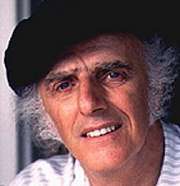_PAGES_LINKS
Ah que l'hiver
:
Poèmes 2005-12-17 (9007 affiches)
Il me reste un pays
:
Poèmes 2005-12-09 (7926 affiches)
La Manikoutai
:
Poèmes 2005-12-17 (9752 affiches)
Le livre (chanson)
:
Poèmes 2008-05-04 (8046 affiches)
Le vieil harmonium
:
Poèmes 2008-05-04 (8083 affiches)
Les gens de mon pays
:
Poèmes 2005-12-09 (9561 affiches)
Mon pays
:
Poèmes 2005-12-09 (10188 affiches)
Oisivetés
:
Poèmes 2008-11-15 (8086 affiches)
Printemps
:
Poèmes 2008-05-05 (11161 affiches)
Quand vous mourrez de nos amours
:
Poèmes 2005-12-17 (8242 affiches)
_PAGES_LINKS |
|

|
|
|
|
Biographie Gilles Vigneault
Gilles Vigneault, (born 27 October 1928) is a Québécois poet, publisher and singer-songwriter, and well-known Quebec nationalist and sovereigntist.
A poet deeply rooted in his native Quebec, Vigneault has become an icon at home and Quebec ambassador abroad. He was one of the principal figures of the generation of chansonniers who helped the Quebec chanson find its own identity, even while helping it find a universal dimension.
Born in Natashquan, on the far north shore of the St. Lawrence River in Quebec, he was educated in Rimouski and Quebec City.
Vigneault started writing poetry during his studies at the Seminary in Rimouski, and by the 1950s was publishing poems and writing songs. In 1959 he founded a publishing house, Les Éditions de l'Arc to distribute his publications. His first collection, Étraves was published in 1959.
In August 1960, at the request of the audience at the boîte à chansons L'Arlequin in Quebec City, he agreed to sing his earliest song: Jos Monferrand, written in 1957, which had been recorded by Jacques Labrecque in 1959. This was the beginning of his singing career which culminated in 1962, when he received the Grand prix du disque from Montreal radio station CKAC. His reputation grew in Quebec and elsewhere with the success of his song Mon Pays, from the sound track of the NFB film La neige a fondu sur la Manicouagan (1965).
In the last half of the 1960s, Vigneault started to perform outside of Quebec, notably in France, but also elsewhere in Canada, including appearances at the Mariposa Folk Festival and at Massey Hall, in Toronto.
The mid-1970s saw Vigneault's participation in several major events. On 13 August 1974 130,000 spectators came together on the Plains of Abraham for the SuperfrancofĂŞte, where Vigneault participated in an historic concert alongside FĂ©lix Leclerc, a representative, in a way, of the older generation, and Robert Charlebois, of the younger generation. A highpoint of the concert was the threesome's rendition of Raymond LĂ©vesque's powerful Quand les hommes vivront d'amour.
On 24 June 1975, during a Saint-Jean-Baptiste Day concert on Montreal's Mount Royal, Vigneault sang for the first time Gens du pays, a song which has since become a sort of anthem in Quebec.
In 1976, the Ensemble Claude Gervaise recorded an album of Vigneault's music entitled Tout l'monde est malheureux: "Claude Gervaise" Joue Vigneault.
An ardent Quebec nationalist, Vigneault was disappointed by the results of the 1980 Quebec referendum.[1] During the 1980s he lived in France for a short time.
|





